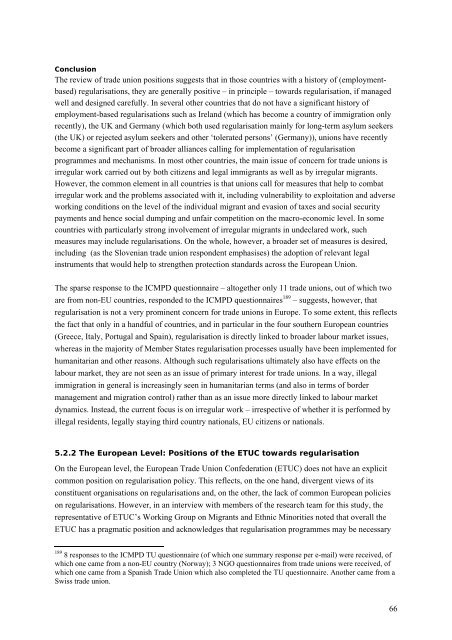REGINE Regularisations in Europe Final Report - European ...
REGINE Regularisations in Europe Final Report - European ...
REGINE Regularisations in Europe Final Report - European ...
Create successful ePaper yourself
Turn your PDF publications into a flip-book with our unique Google optimized e-Paper software.
Conclusion<br />
The review of trade union positions suggests that <strong>in</strong> those countries with a history of (employmentbased)<br />
regularisations, they are generally positive – <strong>in</strong> pr<strong>in</strong>ciple – towards regularisation, if managed<br />
well and designed carefully. In several other countries that do not have a significant history of<br />
employment-based regularisations such as Ireland (which has become a country of immigration only<br />
recently), the UK and Germany (which both used regularisation ma<strong>in</strong>ly for long-term asylum seekers<br />
(the UK) or rejected asylum seekers and other ‘tolerated persons’ (Germany)), unions have recently<br />
become a significant part of broader alliances call<strong>in</strong>g for implementation of regularisation<br />
programmes and mechanisms. In most other countries, the ma<strong>in</strong> issue of concern for trade unions is<br />
irregular work carried out by both citizens and legal immigrants as well as by irregular migrants.<br />
However, the common element <strong>in</strong> all countries is that unions call for measures that help to combat<br />
irregular work and the problems associated with it, <strong>in</strong>clud<strong>in</strong>g vulnerability to exploitation and adverse<br />
work<strong>in</strong>g conditions on the level of the <strong>in</strong>dividual migrant and evasion of taxes and social security<br />
payments and hence social dump<strong>in</strong>g and unfair competition on the macro-economic level. In some<br />
countries with particularly strong <strong>in</strong>volvement of irregular migrants <strong>in</strong> undeclared work, such<br />
measures may <strong>in</strong>clude regularisations. On the whole, however, a broader set of measures is desired,<br />
<strong>in</strong>clud<strong>in</strong>g (as the Slovenian trade union respondent emphasises) the adoption of relevant legal<br />
<strong>in</strong>struments that would help to strengthen protection standards across the <strong>Europe</strong>an Union.<br />
The sparse response to the ICMPD questionnaire – altogether only 11 trade unions, out of which two<br />
are from non-EU countries, responded to the ICMPD questionnaires 189 – suggests, however, that<br />
regularisation is not a very prom<strong>in</strong>ent concern for trade unions <strong>in</strong> <strong>Europe</strong>. To some extent, this reflects<br />
the fact that only <strong>in</strong> a handful of countries, and <strong>in</strong> particular <strong>in</strong> the four southern <strong>Europe</strong>an countries<br />
(Greece, Italy, Portugal and Spa<strong>in</strong>), regularisation is directly l<strong>in</strong>ked to broader labour market issues,<br />
whereas <strong>in</strong> the majority of Member States regularisation processes usually have been implemented for<br />
humanitarian and other reasons. Although such regularisations ultimately also have effects on the<br />
labour market, they are not seen as an issue of primary <strong>in</strong>terest for trade unions. In a way, illegal<br />
immigration <strong>in</strong> general is <strong>in</strong>creas<strong>in</strong>gly seen <strong>in</strong> humanitarian terms (and also <strong>in</strong> terms of border<br />
management and migration control) rather than as an issue more directly l<strong>in</strong>ked to labour market<br />
dynamics. Instead, the current focus is on irregular work – irrespective of whether it is performed by<br />
illegal residents, legally stay<strong>in</strong>g third country nationals, EU citizens or nationals.<br />
5.2.2 The <strong>Europe</strong>an Level: Positions of the ETUC towards regularisation<br />
On the <strong>Europe</strong>an level, the <strong>Europe</strong>an Trade Union Confederation (ETUC) does not have an explicit<br />
common position on regularisation policy. This reflects, on the one hand, divergent views of its<br />
constituent organisations on regularisations and, on the other, the lack of common <strong>Europe</strong>an policies<br />
on regularisations. However, <strong>in</strong> an <strong>in</strong>terview with members of the research team for this study, the<br />
representative of ETUC’s Work<strong>in</strong>g Group on Migrants and Ethnic M<strong>in</strong>orities noted that overall the<br />
ETUC has a pragmatic position and acknowledges that regularisation programmes may be necessary<br />
189 8 responses to the ICMPD TU questionnaire (of which one summary response per e-mail) were received, of<br />
which one came from a non-EU country (Norway); 3 NGO questionnaires from trade unions were received, of<br />
which one came from a Spanish Trade Union which also completed the TU questionnaire. Another came from a<br />
Swiss trade union.<br />
66
















